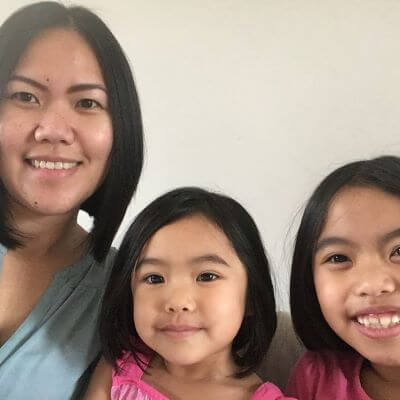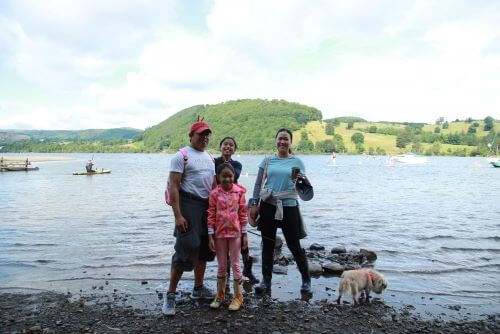

Insights How Faithful+Gould is #UnitedForInclusion
Meet Michelle, Regional Director based in the Cambridge office at Faithful+Gould, a member of the AtkinsRéalis Group. Her background is in quantity surveying and civil engineering.
As commercial lead for the Natwest Capital Investment Programme, Michelle helps deliver over 400 projects every year. She's also the commercial team lead for Cambridgeshire County Council capital projects. So far, her team has helped build new schools and expansions to accommodate at least 17,000 pupil places.
Michelle is also mum to Isabella, 12, and Zara, 8. She enjoys basketball and Stephen King books (but not the movies). A keen volunteer at the local Catholic church, she has helped with the children's liturgy (pre-Covid) and stars as a festive elf at the yearly Father Christmas event.
The theme for National Inclusion Week 2021 is #UnitedForInclusion. How will Faithful+Gould get involved?
Faithful+Gould values being diverse as an organization. As well as offering a huge range of services to our customers, we're also a community of people of varying capabilities and personal standings, celebrating different preferences, cultures, and religions.
We're also united in respecting each other and encouraging inclusion. Faithful+Gould facilitates a safe place for every employee to do more than deliver their work properly and safely. It encourages us to be proud of our uniqueness and to inspire future diverse talent to consider the industry and what they can bring to our mix.
Why are you particularly interested in pushing back against stereotypes?
As an immigrant working mother with an Asian background, I've encountered stereotyping for most of my life. It had got to the point where I'd accepted that perhaps it is indeed normal, and I've become biased myself.
Our current drive for ED&I and recent events in the US, UK and worldwide woke me up. I realized that merely 'ignoring' the stereotyping comments, whether intended to hurt or not, made me part of the problem. Putting up a wall doesn't solve the problem either. It only builds it up.
As a mother, I'd never tell my children just to let stereotyping comments pass or ever think that it's ok or their fault. As a line manager and team leader, I can't limit this to my children. I should be encouraging colleagues at all levels to push back against stereotypes.
Thinking about being #UnitedForInclusion, how does stereotyping challenge unity?
It starts when a person associates a characteristic with a group. The challenge is when people within a group need each other's support but instead receive stereotyping within their supposedly safe and encouraging group.
It's important to fully understand that being united doesn't always mean being the same. Members of a parenting network, for example, may all have the commonality of dealing with parenthood. However, some may be single parents while others may also still be trying to be parents.
So while networks provide a safe platform to seek other individuals with similar struggles or celebrations, each individual will still be going through unique situations. Everyone will have different experiences, and therefore also differing views.
As we become more aware of our diversity and similarities, we can stop just looking for differences. Instead, we can unite while appreciating more about all the people around us and their experiences.
What's so wrong with stereotypes?
"It's just joking, and there's some truth to those stereotypes anyway?" Many people might think that some stereotyping is meant to be harmless. But this is a false sense of entitlement. When people stereotype, they ignore the individuality and uniqueness of the person they are judging.
Nobody likes a bully, and when you realize that by labelling someone repeatedly in a negative way, even though it may not seem harmful to you, it hurts them, and the resulting effect is the same as bullying. It leaves a person feeling inferior and unimportant, leading to a self-fulfilling prophecy that perpetuates the stereotype. When you stereotype someone, you devalue them, and you miss out on an opportunity to learn.
What are some examples of stereotyping?
As an Assistant Quantity Surveyor (QS), I was once asked by a senior colleague to join a meeting as a Mandarin translator for a new Chinese client. I'm originally from the Philippines and do not know how to speak Mandarin, yet it was assumed I could solely based on what I look like.
When I was a Managing QS, I did an MBTI personality test, and the coach predicted me completely inaccurately. He assumed that because I was a mother, I'd always prioritize feelings over logic and spoke about my family and career as if they were on opposite ends of what's important to me.
On our first ride on the tube, my husband, also from the Philippines, started asking one of the passengers a question. Before he could even say his first word, the passenger cut in, saying, 'sorry, I only speak English.' We both speak English fluently.
Stereotyping can be so ingrained in a culture. How can we stop doing it?
The upset that this kind of stereotyping causes isn't hard to avoid. Try to see the diversity around you and the benefits it brings. For example, the more diverse your project team, the greater the mix of ideas, skills and innovations you will have.
When you eat at a restaurant or buy new clothes, stop to think about why we have so many exciting choices. These wouldn't have been possible if only one idea had been created and repeated by like-minded people.
We just need to be kinder to those around us and question our motivations before making assumptions about them. Everyone is unique. You are unique. So, celebrate yourself and help others celebrate their uniqueness too.
How does the organization challenge stereotypes?
Faithful+Gould has a fantastic ED&I strategy led by Dara, a wonderful person genuinely passionate about diversity. We have various platforms for many groups such as Embrace (BAME Network), ParentNet, Empower (Women's Professional Network), Equilibrium (LGBTQ+ Network), Faith Network, Menopause Awareness Group, Neurodiversity Network and many more.
Our networks raise awareness of how diverse our community is, ensuring we feel safe celebrating who we are. Most importantly, these networks are open to everyone. So we're always learning and understanding each other's varied cultures, struggles and successes, opposed to just making biased assumptions. We challenge stereotypes by encouraging everyone to be mindful of people's individualities – we appreciate our differences.
What challenges do you have to learn from?
Maybe it's because I've been experiencing it for so long that I'm still learning to recognize when I'm stereotyped. Or perhaps I'm still learning to speak up because I prefer to avoid confrontation. Neither is an excuse, and I can't tell the young people I speak to one thing and then practice another. We should never let others make us feel like second-class citizens. Always find the courage to call it out.
How do you keep yourself challenged?
I accept that we are just human and that we do possess unconscious biases. I continually remind myself to be careful about stereotyping others. For example, assuming things about my children or the colleagues I manage.I want to use my personal experience and knowledge to try and turn this around. I try to be actively involved in different groups, either volunteering or helping out on initiatives to help our organization be more inclusive and appreciative of diversity.
As a STEM Ambassador, I'm keen to encourage girls to consider a career in construction and for ethnic minorities and those from less privileged backgrounds to have the same career opportunities as anyone else. I don't just want to help raise awareness – I personally want to transform it into action. Doing it myself and getting involved is part of that.
Keen to make a positive impact on the world?
Find out more about careers, and please take a look at our equality diversity and inclusion, awareness and ambitions.
Interested? Find out more about life at AtkinsRéalis
Sign up to receive the latest content tailored to your interests
Our articles

Preview
USAContent type
BlogsPublish date
05/02/2024
Summary
The structural engineering market is experiencing rapid changes, with Net Zero goals, advanced technology, and environmentally conscious building practices becoming the new bread and butter of t

Preview
USAContent type
BlogsPublish date
05/01/2024
Summary
Hydraulic engineering is a branch of civil engineering that specializes in building hydraulic engineering designs—‘hydraulic’ stemming from the Ancient Greek word for water. Hydraulic power, the

Preview
Middle EastContent type
BlogsPublish date
04/30/2024
Summary
In an ambitious and far-reaching declaration, Saudi Arabia has proudly announced 2024 as the 'Year of the Camel', a tribute to these timeless creatures that embody the heart of Arabian heritage

Preview
Middle EastContent type
BlogsPublish date
04/29/2024
Summary
As a hub of diversity and multiculturalism, the UAE boasts a thriving economy with rapidly growing infrastructure. Steering away from a reliance on oil and toward cutting-edge innovation, the UAE is

Preview
EuropeContent type
BlogsPublish date
04/29/2024
Summary
Meet Tom from our D&AT (Design & Advanced Technology) team. He's an associate at AtkinsRéalis who has built an exciting career on diverse and career-defining projects, including work on the Lo

by
Shailaja Mantha

Preview
Middle EastContent type
BlogsPublish date
04/26/2024
Summary
By implementing reforms in the public sector and wider society, the KSA’s Vision 2030 has greatly improved government efficiency, bringing about new growth and investment opportunities. What is Visio
.jpg)
Preview
IndiaContent type
BlogsPublish date
04/25/2024
Summary
In the ever-evolving landscape of professional endeavours, finding a workplace that feels like your safe space is a rare gem. AtkinsRealis stands as a beacon in this regard, where talents not only
.jpg)
Preview
IndiaContent type
BlogsPublish date
04/25/2024
Summary
In the ever-evolving landscape of urban drainage modelling, AtkinsRéalis stands as the leaders with large highly skilled urban drainage modellers. Our focus on serving our clients around urban dra

Preview
CanadaContent type
BlogsPublish date
04/25/2024
Summary
Since the start of the COVID-19 pandemic, the skill of managing constantly changing environments has become more and more important. New construction project management software offers innovativ
+(1).jpg)
Preview
AustraliaContent type
BlogsPublish date
04/24/2024
Summary
In a momentous shift, SNC-Lavalin has transitioned to AtkinsRéalis, marking a new era of innovation, collaboration, and excellence in engineering consultancy. With this rebrand comes a fresh persp
.jpg)
Preview
IndiaContent type
BlogsPublish date
04/23/2024
Summary
As Mumbai continues to evolve and expand, the demand for sustainable infrastructure and cutting-edge technology has never been more pressing. At the forefront of this transformative journey is Atk

Preview
EuropeContent type
BlogsPublish date
04/22/2024
Summary
Hi there! I'm Paul, a civil engineer with over 25 years of experience specializing in networks and drainage engineering. My role at AtkinsRéalis spans managing projects, directing major initia

by
Shailaja Mantha

AtkinsRéalis
Equality, diversity and inclusion
We’re devoted to growing the diversity of our people, promoting an inclusive culture, providing everyone with an equal voice because simply put, it’s the right thing to do. Click to learn more.
Find out more




